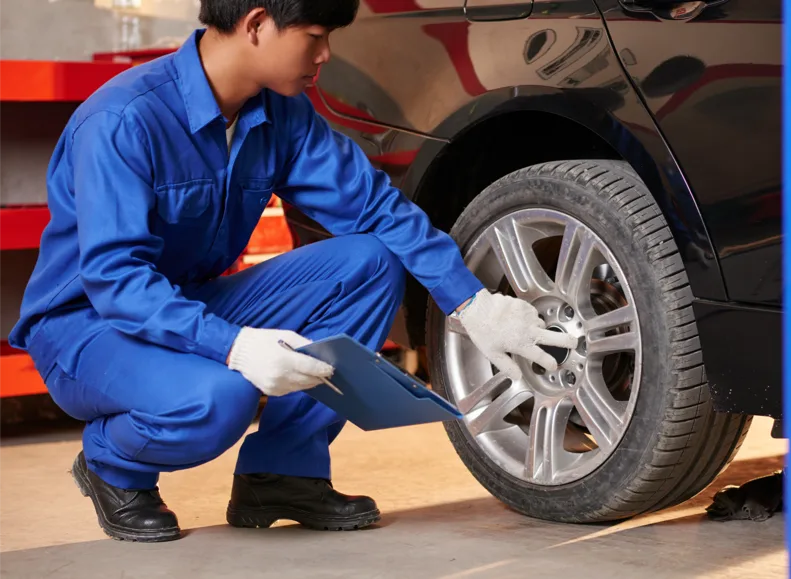Ensuring the roadworthiness of every vehicle in your commercial fleet is one of the most critical responsibilities of fleet managers. Regular vehicle checks not only enhance safety but also improve efficiency and reduce costs associated with breakdowns or accidents.
With the colder months approaching, winter brings additional challenges that demand special attention to fleet maintenance. Incorporating routine vehicle checks into your operations helps keep vehicles in top condition and ensures the safety of drivers and other road users.
The Importance of Vehicle Checks in Fleet Management
Implementing regular vehicle checks is a cornerstone of effective fleet management. For commercial fleets, maintaining compliance with safety regulations and minimising operational disruptions are top priorities. Routine inspections reduce the risk of accidents caused by technical failures and ensure all vehicles are fit for purpose.
According to the European Parliament, technical failures account for about 5% of road accidents, while poor maintenance contributes to an additional 4%. Shockingly, many accidents involving commercial fleets stem from inadequate vehicle checks, highlighting their importance for safety and operational efficiency.
Benefits of Preventative Maintenance for Commercial Fleets
Minimising Costs
A proactive approach to maintenance significantly reduces the risk of unexpected repairs and downtime. Regular vehicle checks help fleet managers identify potential issues early, avoiding costly breakdowns.
For commercial fleets, where vehicles are crucial to business operations, unscheduled repairs can lead to financial losses and delayed deliveries, impacting customer satisfaction. Preventative maintenance ensures smoother operations and long-term savings.
Enhancing Safety
Safety is a top concern for every commercial fleet. Daily vehicle checks, including walkaround inspections, help identify issues such as brake malfunctions, worn tyres, or faulty lights, which could compromise road safety.
Drivers and fleet managers are legally responsible for ensuring that vehicles meet safety standards. Regular checks not only prevent accidents but also protect drivers and other road users.
Ensuring Compliance
For heavy goods vehicles (HGVs) and other commercial fleets, compliance with legal requirements is non-negotiable. In the UK, drivers are mandated to perform walkaround checks before every journey. These vehicle checks must be documented, and any identified defects must be addressed before the vehicle is driven.
Non-compliance can result in fines, penalties and even vehicles being taken off the road. Fleet management systems, such as Prolius Fleet, streamline compliance by automating inspection records and defect reporting.
Key Components of Vehicle Checks
Daily Walkaround Inspections
Daily vehicle checks involve inspecting essential components such as tyres, brakes, lights, and mirrors. For commercial fleets, these checks are crucial for spotting visible defects that could affect safety and performance.
Providing drivers with predefined checklists simplifies the process, ensuring consistency and thoroughness. Digital tools enable real-time defect reporting, making it easier to address issues promptly.
Scheduled Inspections and Servicing
While daily checks are vital for spotting immediate concerns, scheduled inspections delve deeper into vehicle health. These inspections assess components such as wheel alignment, belts, and engine systems, uncovering potential long-term issues.
Regular servicing ensures compliance with MOT standards and keeps vehicles performing efficiently. For commercial fleets, scheduling inspections based on mileage or operating conditions is a best practice.
Brake Systems
Brake malfunctions are one of the most common causes of accidents involving commercial fleets. Regular checks of brake pads, discs, and fluid levels help prevent failures. Additionally, advanced braking systems in modern fleets require periodic calibration to maintain effectiveness.
Tyre Maintenance
Tyres are a critical safety component for any commercial fleet. During daily vehicle checks, inspecting tread depth, pressure, and signs of wear helps ensure optimal performance. For fleets operating in colder climates, investing in winter tyres or all-season tyres enhances grip and reduces risks on icy roads. Learn about tyre safety.
Electrical Systems
The electrical systems in commercial fleets power essential features such as lights, indicators, and onboard diagnostics. Regularly inspecting wiring and connections prevents malfunctions that could compromise safety or vehicle performance.
Leveraging Technology for Vehicle Checks in Commercial Fleets
Fleet management solutions, such as Prolius Fleet, have revolutionised the way vehicle checks are performed. By digitising inspection processes, these tools enable fleet managers to monitor vehicle health, schedule maintenance, and track defect resolution in real time.
Benefits of Digital Vehicle Checks
- Improved Accuracy: Digital checklists ensure that inspections are thorough and consistent.
- Real-Time Reporting: Defects can be reported instantly via mobile apps, reducing delays in addressing issues.
- Compliance Tracking: Automated record-keeping simplifies compliance with legal standards and audit requirements.
Integrating Telematics
Telematics systems provide valuable insights into vehicle performance, including fuel efficiency, engine diagnostics and driver behaviour. Integrating telematics with digital inspection tools enhances the effectiveness of vehicle checks and helps optimise fleet performance.
How Prolius Fleet Simplifies Vehicle Checks
Prolius Fleet offers an innovative platform for managing vehicle checks across commercial fleets. The system streamlines inspection workflows, from daily walkaround checks to scheduled maintenance, ensuring that vehicles remain roadworthy and compliant.
Features of Prolius Fleet
- Mobile App for Inspections: Drivers can perform checks using a user-friendly app, reducing paperwork and improving efficiency.
- Automated Alerts: Receive notifications for upcoming maintenance tasks, inspections, or compliance deadlines.
- Data Insights: Access comprehensive reports on vehicle health and performance to make informed decisions.
By adopting Prolius Fleet, managers can enhance the safety, reliability, and productivity of their commercial fleets, ensuring that every vehicle check contributes to operational excellence.
Conclusion
For commercial fleets, regular vehicle checks are more than just a legal obligation—they are a cornerstone of safety, efficiency and reliability. By incorporating daily inspections, scheduled servicing, and advanced digital tools, fleet managers can optimise operations and minimise risks.
Get in touch with Prolius Fleet today to learn how digitising the vehicle check process can transform your fleet management and drive success for your business.
